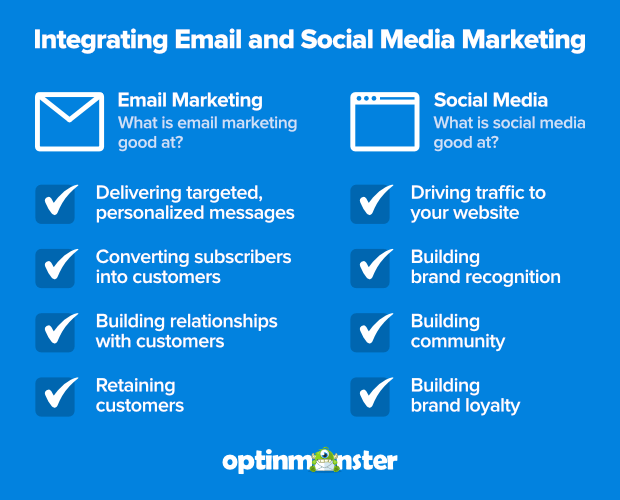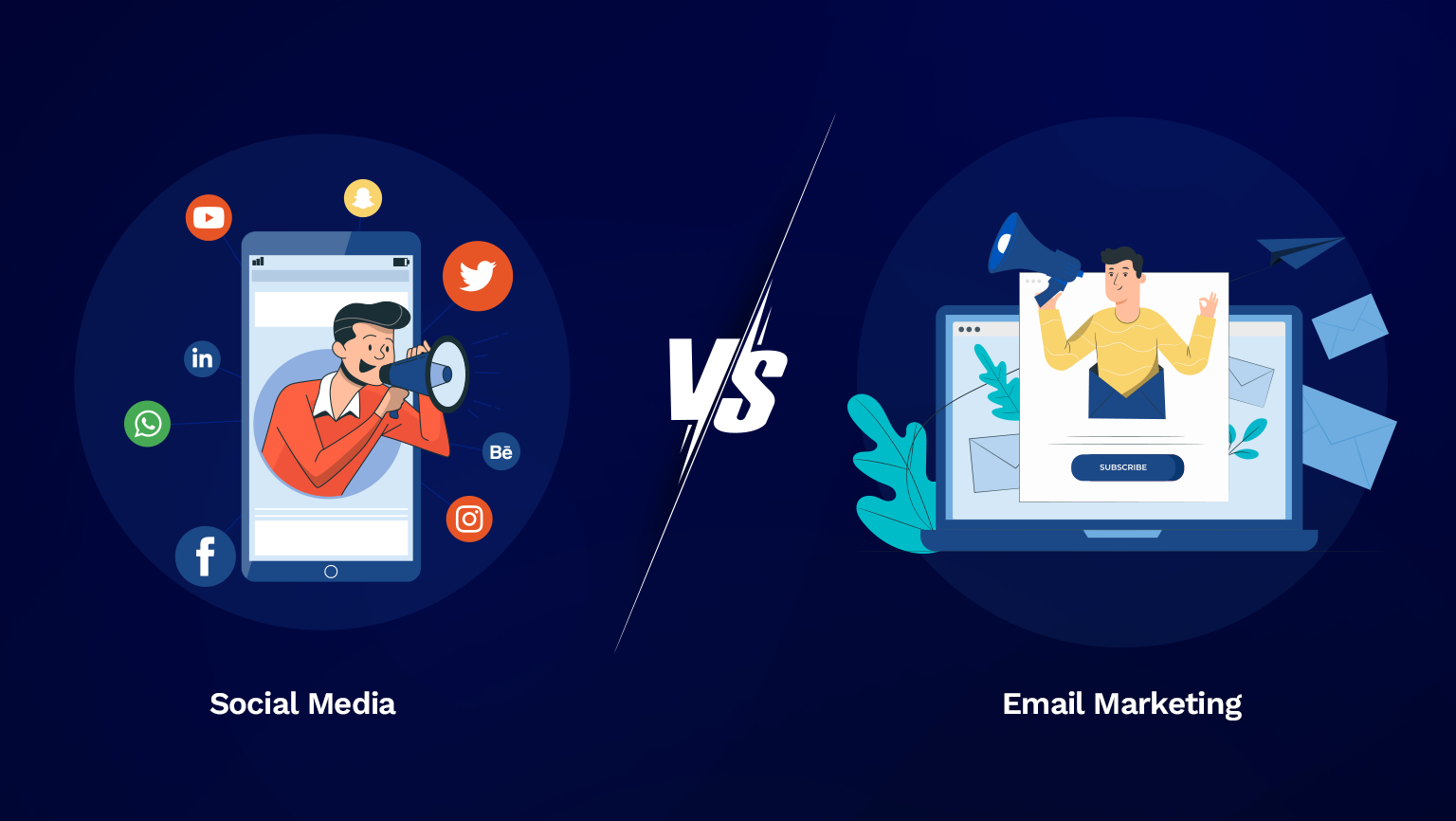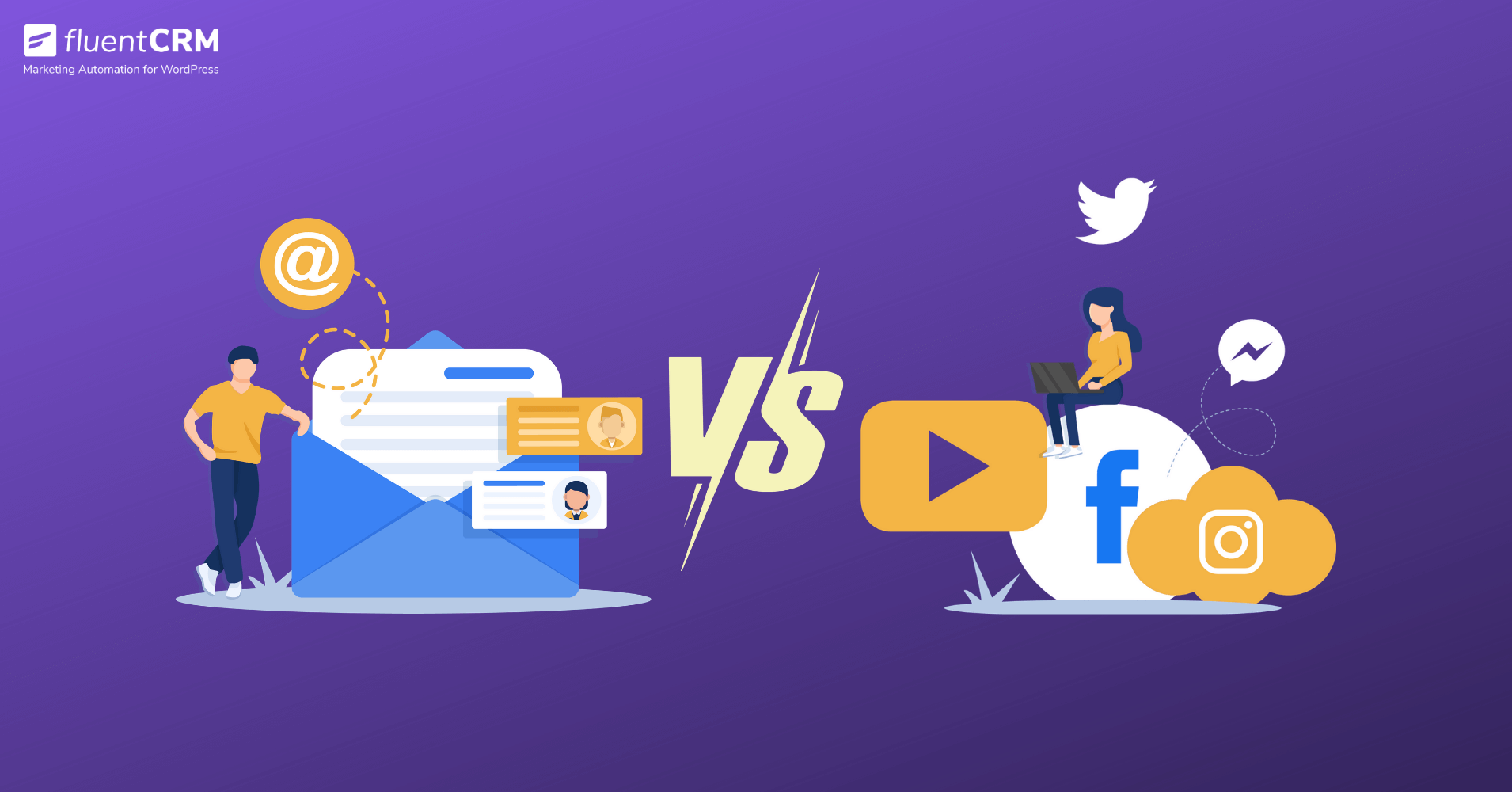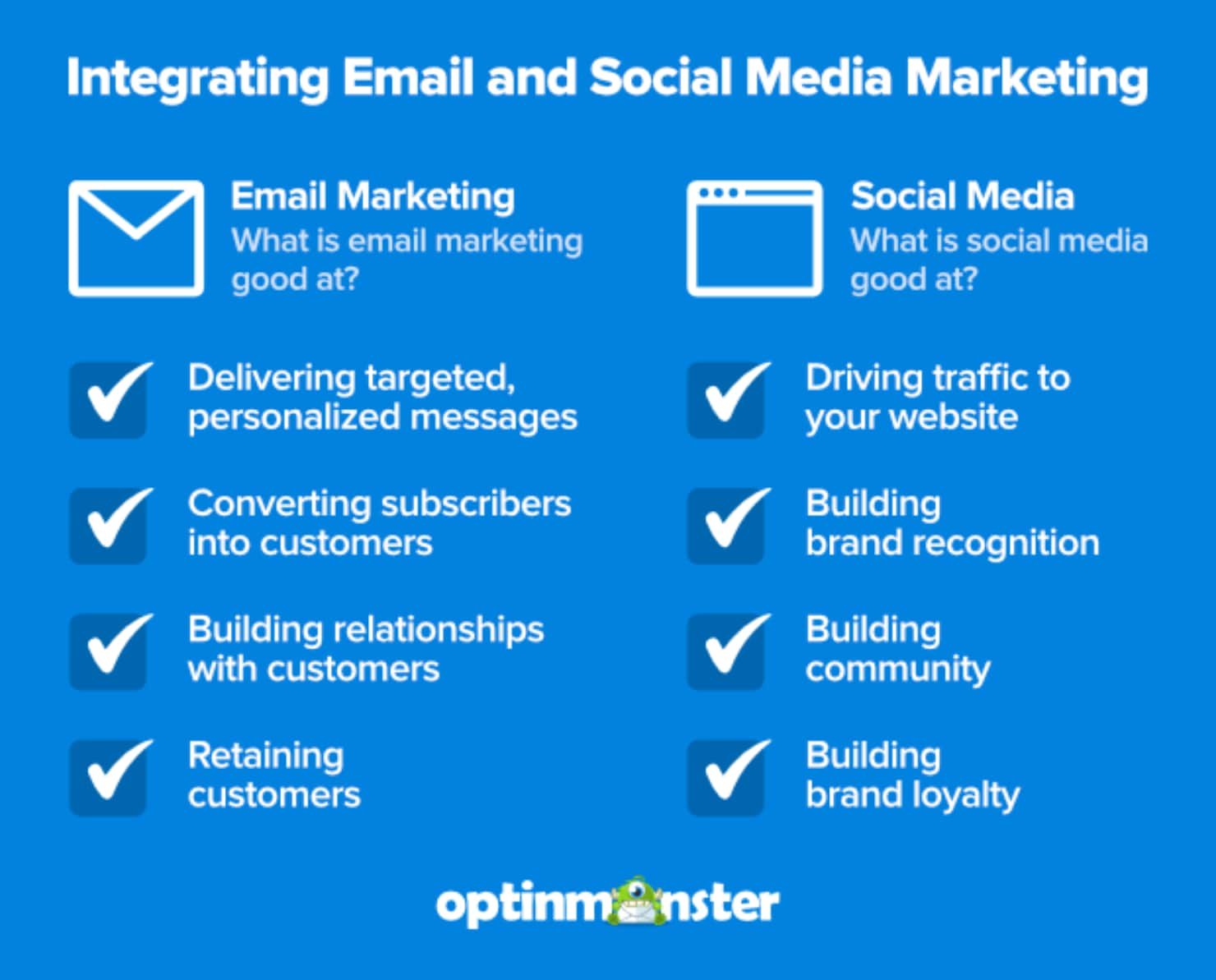In the marketing world, email and social media are two powerful tools. Both have unique strengths and serve different purposes.
Understanding the differences between email marketing and social media marketing is crucial. Each method offers distinct advantages that can impact your business strategy. Email marketing excels in delivering personalized messages directly to your audience’s inbox. Social media marketing, on the other hand, thrives on engagement and broad reach. As you navigate this landscape, knowing how each method works can help you make informed decisions. Whether you’re aiming to boost sales or build a community, understanding these tools can shape your success. Dive into this comparison to see which method aligns best with your goals. Ready to enhance your marketing efforts? Check out Sender, an omnichannel platform designed to automate campaigns and improve audience engagement through advanced segmentation and integrations. Learn more about Sender here.
Introduction To Email And Social Media Marketing
Email marketing uses emails to send promotional messages. It aims to engage the audience and build relationships. Emails can include newsletters, offers, and updates. This method is direct and personal. It allows businesses to reach their audience easily. It helps in driving traffic and sales.
Social media marketing uses platforms like Facebook and Twitter. Businesses post content to engage followers. This can include photos, videos, and stories. It helps in creating brand awareness. It also allows interaction with the audience. This method is more public and can reach a wider audience.
Email marketing focuses on building a targeted audience. It is efficient and cost-effective. The approach is direct and personalized. Social media marketing creates brand awareness. It engages with a broader audience. Both strategies are essential for a complete marketing plan. They complement each other and enhance overall reach.
Sender is an omnichannel marketing platform. It enhances email and SMS marketing. It automates campaigns for better efficiency. Advanced segmentation improves audience engagement. Seamless integration with popular tools is available.
Main features include:
- Email and SMS Marketing: Combines email and SMS for outstanding results.
- Marketing Automation: Automates sequences for effortless management.
- Audience Segmentation: Uses data for targeted messaging.
- Integrations: Works with WordPress, Shopify, and more.
- Premium Capabilities: Helps acquire leads and grow sales.
- 24/7 Customer Support: Quick and reliable assistance.
Benefits include increased efficiency and enhanced engagement. Comprehensive integration ensures smooth operations. Reliable support is available anytime.
Pricing details:
- Christmas Sale: 40% off on all annual plans.
- Free Trial: Start for free, no credit card needed.
Users can cancel subscriptions anytime. Additional resources and user testimonials are available. Support is offered through various channels.
Key Features Of Email Marketing
Email marketing boasts targeted audience engagement, measurable results, and personalized content. Social media marketing offers broader reach and real-time interaction. Both have unique strengths.
Personalization And Targeting
Email marketing allows for personalized content. Messages can be tailored to individual preferences. This leads to higher engagement. Targeted campaigns ensure the right message reaches the right audience. This improves conversion rates.
Automation And Drip Campaigns
Automation makes email marketing efficient. Drip campaigns send emails over time. They keep the audience engaged. This method nurtures leads effectively. It saves time and effort.
Direct Communication Channel
Email marketing is a direct channel. It goes straight to the inbox. This ensures the message is seen. No algorithms control visibility. It’s a reliable way to reach your audience.
Key Features Of Social Media Marketing
Social media platforms have billions of users. This means a wide audience can be reached. Posts can get likes, shares, and comments. Engagement happens quickly. Brands can interact with customers directly. This builds relationships and trust. It is effective for brand visibility.
Content can go viral on social media. A single post can be shared many times. This increases the reach and visibility of the brand. Viral content spreads fast. It can attract new followers and customers. It is a powerful tool for brand awareness.
Influencers have a large following. Collaborating with them can boost a brand’s reach. Influencers can create authentic content. Their followers trust their recommendations. This can lead to increased sales and brand loyalty. It is a strategic way to enhance marketing efforts.
Sender is an omnichannel marketing platform. It enhances email and SMS marketing. Campaigns are automated for ease. Audience engagement improves with advanced segmentation. It integrates with tools like WordPress and Shopify. Premium features help grow sales and revenue.
- Email and SMS Marketing
- Marketing Automation
- Audience Segmentation
- Integrations with popular tools
- 24/7 Customer Support
Increased Efficiency: Save time with automated campaigns.
Enhanced Engagement: Higher conversion rates with targeted messaging.
Comprehensive Integration: Connect easily with existing tools.
Reliable Support: Quick and helpful assistance available 24/7.
Christmas Sale: 40% off all annual plans. Free Trial: Start for free, no credit card needed. Cancel anytime.
Cancel Anytime: Easy subscription cancellation without hassle.
Access marketing blogs, help centers, and training videos. Trusted by over 180,000 businesses. Support available on Facebook, YouTube, Twitter, and LinkedIn.

Credit: optinmonster.com
Comparing Roi: Email Marketing
Email marketing is often more cost-effective than social media marketing. Sending emails to a list of subscribers costs very little. Most email platforms offer affordable plans. Social media ads can be expensive and require a larger budget. Email marketing allows for direct communication with a targeted audience, reducing unnecessary spending.
Email marketing typically boasts higher conversion rates. Subscribers have already shown interest in your content. This makes them more likely to engage with your emails. Social media users may not be as invested in your brand. Emails can be personalized, leading to higher engagement and conversions.
Both email and social media marketing offer tracking and analytics tools. Email platforms provide detailed reports on open rates, click-through rates, and conversions. Social media platforms also offer insights, but the data can be less specific. Email marketing allows for better optimization based on clear metrics.
Comparing Roi: Social Media Marketing
Comparing ROI: Social Media Marketing versus Email Marketing reveals differences in cost, reach, and engagement. Email often shows higher conversion rates. Social media excels in brand awareness.
Advertising Costs
Social media marketing often involves lower advertising costs compared to traditional methods. Many platforms allow for budget-friendly ad campaigns. This makes it accessible to small businesses. Social media ads can be tailored to fit various budgets. Cost per click (CPC) tends to be lower on social media. This can lead to more cost-effective campaigns. Overall spend can be controlled easily.
Engagement Metrics
Engagement metrics on social media include likes, shares, and comments. These metrics are key indicators of user interaction. High engagement often leads to better brand visibility. Social media platforms offer detailed analytics. This data helps in understanding audience behavior. Real-time feedback is another advantage. It allows for quick adjustments to strategies.
Brand Awareness
Social media marketing significantly boosts brand awareness. Regular posts keep the brand top-of-mind. Sharing valuable content attracts followers. Social media platforms have millions of daily users. This wide reach is beneficial for brands. Visual content like images and videos further enhance brand recall. Consistent engagement builds a loyal community.
Pros And Cons Of Email Marketing
Email marketing is cost-effective. It allows businesses to reach a large audience without spending much. Emails are personalized. This makes the message more relevant to the recipient. Automation helps send messages at the right time. This increases the chances of engagement. Analytics provide detailed insights on performance. This helps in improving future campaigns. Email marketing is scalable. You can start small and grow your list over time.
Email marketing can be seen as spam. Many people ignore or delete emails without reading. Deliverability can be an issue if emails end up in spam folders. Designing emails that look good on all devices can be challenging. Some emails might not display correctly on mobile phones. List management requires constant updating. Old or inactive emails reduce effectiveness. Privacy laws like GDPR need compliance. This adds extra work for businesses.
Pros And Cons Of Social Media Marketing
Social media marketing reaches a large audience quickly. Engagement with users is direct and instant. Content can go viral, spreading your message widely. Ad targeting is precise, reaching specific demographics. Feedback is immediate, helping to refine strategies. Cost-effective advertising options fit any budget. Visual content is highly shareable and engaging.
Constant updates are needed to stay relevant. Negative feedback can spread quickly and damage reputation. Algorithm changes can reduce visibility of posts. Time-consuming to create and manage content. Ad costs can rise as competition increases. Limited control over platform rules and changes. Shorter attention spans may affect message retention.

Credit: www.ayokay.com
Which One Drives Better Roi?
Email marketing often delivers a higher ROI due to its direct reach and personalization. Social media marketing, while effective for brand awareness, may not drive conversions as efficiently.
Context And Industry-specific Factors
Certain industries benefit more from email marketing. Retail and e-commerce often see better results with email. Social media marketing works well for lifestyle and entertainment sectors. Sender can help with email and SMS campaigns. Use it to reach your audience effectively. The right choice depends on your industry and goals.
Audience Demographics And Preferences
Email is preferred by older audiences. Younger people favor social media. Knowing your audience is key. Sender uses advanced segmentation for targeted messaging. This helps in reaching the right people. Analyze your audience’s preferences. This will guide your marketing strategy.
Integration Of Both Strategies For Optimal Results
Combining email and social media can be powerful. Use both to maximize reach. Sender supports integration with popular tools. This makes it easy to manage both strategies. Automated campaigns save time and effort. Increase engagement and conversions by using multiple channels.
Recommendations For Businesses
Email marketing is great for building strong relationships with your audience. It works well for sharing detailed content such as newsletters or product updates. Businesses can use email to reach existing customers with personalized offers. Email is also effective for drip campaigns and nurturing leads over time. If a business needs a direct communication channel, email is the best choice.
Social media marketing excels in building brand awareness quickly. It is perfect for engaging with a broad audience and generating buzz around new products. Businesses can use social media to interact with customers and gather feedback. Social platforms are ideal for running ads and reaching new potential clients. If a business wants to go viral, social media is the way to go.
Combining email and social media marketing can deliver the best results. Use email for detailed communication and personalized offers. Use social media for brand awareness and customer engagement. This balanced approach ensures you reach a wider audience and maintain strong relationships. Both methods together can maximize your marketing efforts.

Credit: fluentcrm.com
Frequently Asked Questions
What Is More Effective, Email Or Social Media Marketing?
Email marketing often yields higher conversion rates. Social media marketing, however, boosts brand awareness and engagement. Both have unique advantages.
How Do Email And Social Media Marketing Differ?
Email marketing targets individual subscribers directly. Social media marketing reaches a broader audience through platforms. Both strategies complement each other.
Which Is Cheaper, Email Or Social Media Marketing?
Email marketing is generally more cost-effective. Social media marketing can be pricier due to advertising costs. Budget considerations are crucial.
Can Email Marketing And Social Media Marketing Be Combined?
Yes, combining both strategies enhances overall marketing efforts. Cross-promotion increases engagement and reach. Integrating both can maximize results.
Conclusion
Choosing between email and social media marketing depends on your goals. Email marketing offers direct communication and measurable results. Social media marketing enhances brand visibility and engagement. Both strategies have unique strengths. Combining them can yield powerful outcomes. For a robust marketing approach, consider using Sender, an omnichannel platform. It integrates email and SMS marketing, automates campaigns, and segments audiences effectively. Enhance your marketing efforts with Sender today. Learn more about Sender and elevate your marketing strategy.

